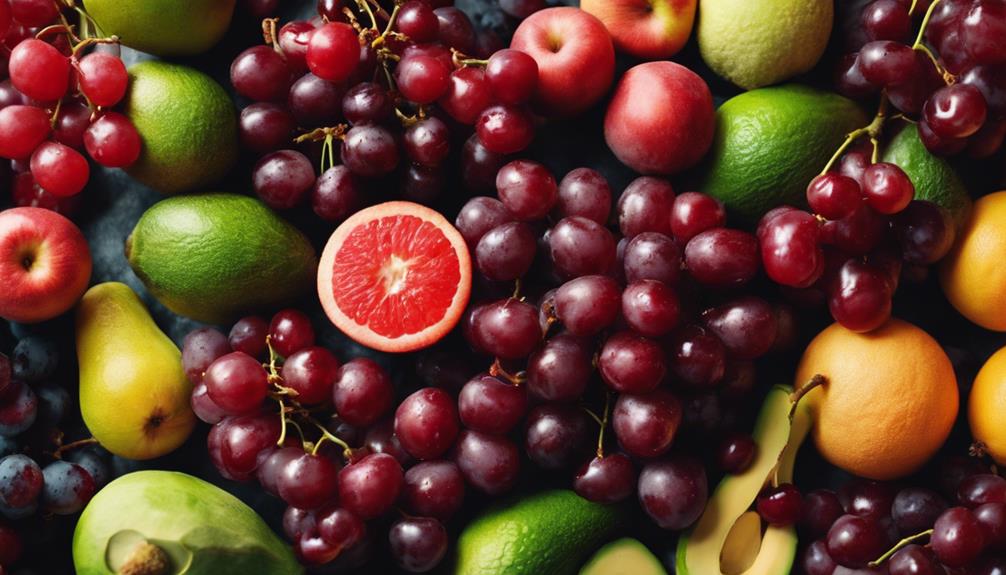Exploring the realm of canine nutrition unveils a fascinating array of fruit options that can serve as wholesome additions to a dog's diet. From crunchy apples to juicy watermelon, the world of fruits for dogs is both intriguing and beneficial.
However, not all fruits are created equal when it comes to our furry friends' health. Understanding the nuances of which fruits are safe and nutritious for dogs is crucial for responsible pet ownership.
So, which fruits can dogs eat, and which are best to share with your pup? Let's uncover the top selections that can enrich your dog's diet while prioritizing their well-being.
Key Takeaways
- Fresh fruits like apples and blueberries are safe and nutritious for dogs.
- Consult a vet before introducing fruits to your dog's diet.
- Limit fruit treats to ensure they don't exceed 10% of your dog's daily calories.
- Avoid toxic fruits like grapes and avocado to prevent harm to your pup.
Safe Fruits for Dogs
When considering safe fruits for dogs, it is important to prioritize options that provide hydration and essential nutrients without compromising their health. Apples, bananas, blueberries, strawberries, and watermelon are among the recommended fruits for dogs. These fruits offer hydration and are lower in calories compared to other treats, making them a healthy addition to a dog's diet.
Benefits of Fruit Consumption
Considering the nutritional advantages fruits offer to dogs, the benefits of incorporating these hydrating and nutrient-rich options into their diet are significant.
- Fruits provide essential vitamins and minerals that contribute to overall health.
- They are hydrating and low in calories, making them a healthy treat option.
- Including a variety of fruits can keep dogs interested and provide different health benefits.
- The natural sugars in fruits are a better alternative to processed treats for dogs, promoting better weight management and digestion.
Fruits to Avoid

Caution should be exercised when offering fruits to dogs, as certain varieties can be toxic and harmful to their health. Some fruits can cause serious health issues or even be fatal to dogs. Here are some fruits that dogs should avoid:
| Fruits to Avoid | Toxicity Level | Potential Harm |
|---|---|---|
| Avocado | High | Cardiac distress |
| Cherry | High | Cyanide poisoning |
| Apricot | High | Cyanide poisoning |
| Peach | High | Cyanide poisoning |
| Plum | High | Cyanide poisoning |
It's crucial to be aware of these toxic fruits to prevent any accidents and ensure the safety of dogs.
Handling Toxic Fruit Ingestion
Awareness of toxic fruits is crucial for dog owners, especially when it comes to handling instances of fruit ingestion that may pose a risk to their pet's health.
In cases of toxic fruit ingestion, immediate action is necessary to ensure the well-being of the dog. Here are some key steps to take:
- Contact a vet promptly after suspecting or witnessing a dog consuming a toxic fruit.
- The Pet Poison Helpline can offer guidance on the toxicity level of the fruit ingested.
- Refrain from inducing vomiting without professional advice as it can exacerbate the situation.
- Quick response and appropriate measures are vital to address a dog ingesting a toxic fruit, safeguarding their health and minimizing potential harm.
Additional Resources

For further information and guidance on fruits that are safe for dogs and handling instances of toxic fruit ingestion, dog owners can access a variety of additional resources. Veterinarians are a primary source of reliable information and can offer personalized advice based on a dog's specific health needs.
Websites such as the American Kennel Club (AKC) and the ASPCA (American Society for the Prevention of Cruelty to Animals) provide comprehensive lists of fruits that are safe or toxic for dogs, along with guidelines on what to do in case of fruit ingestion.
Dog owners can also consult with pet nutritionists for tailored dietary recommendations. Staying informed through reputable sources is essential for ensuring the well-being of canine companions when incorporating fruits into their diet.
Conclusion
In conclusion, understanding the appropriate fruits for dogs to eat is essential for their overall health and well-being. By incorporating safe and beneficial fruits into their diet, pet owners can provide valuable nutrients and antioxidants to support their furry companions' health.
Avoiding toxic fruits and being mindful of potential hazards ensures that dogs can enjoy the benefits of fruit consumption without any negative consequences.
With proper knowledge and guidance, pet caregivers can make informed decisions to enhance their dogs' dietary health.




